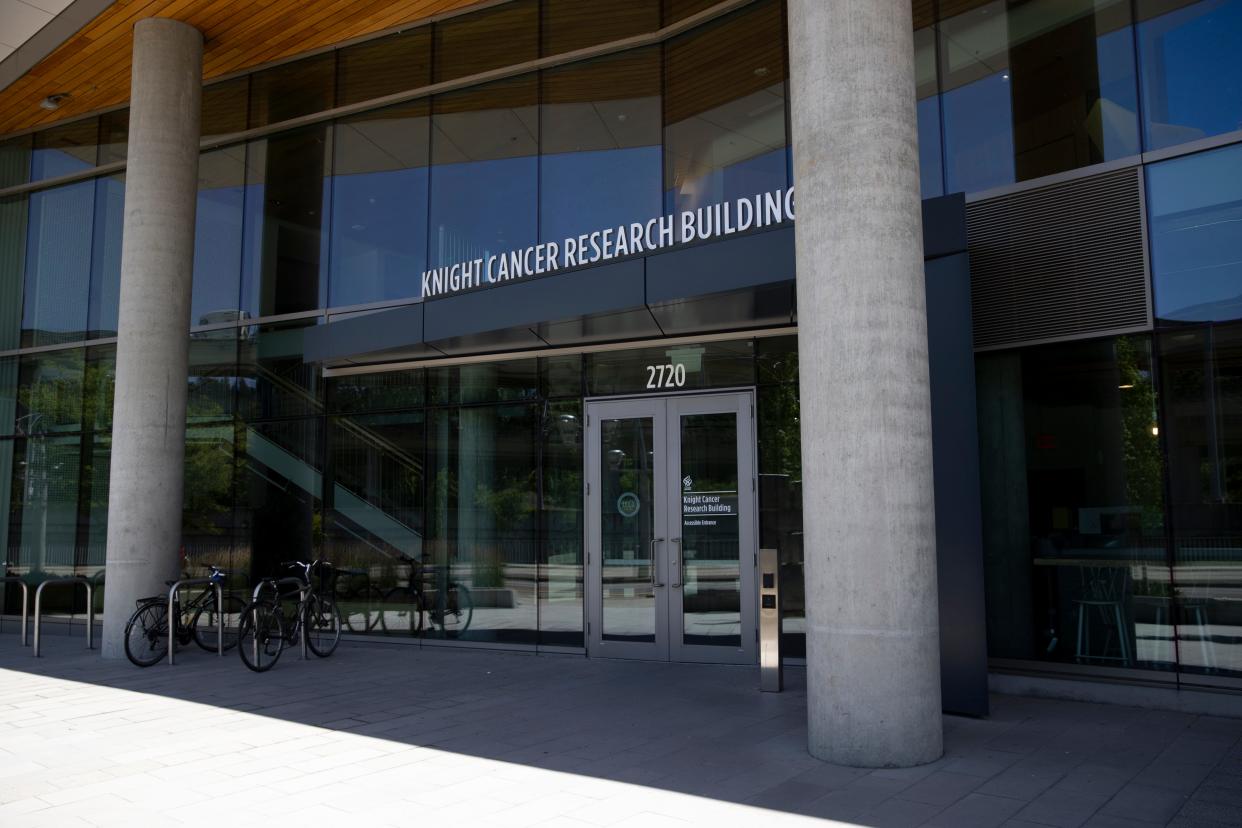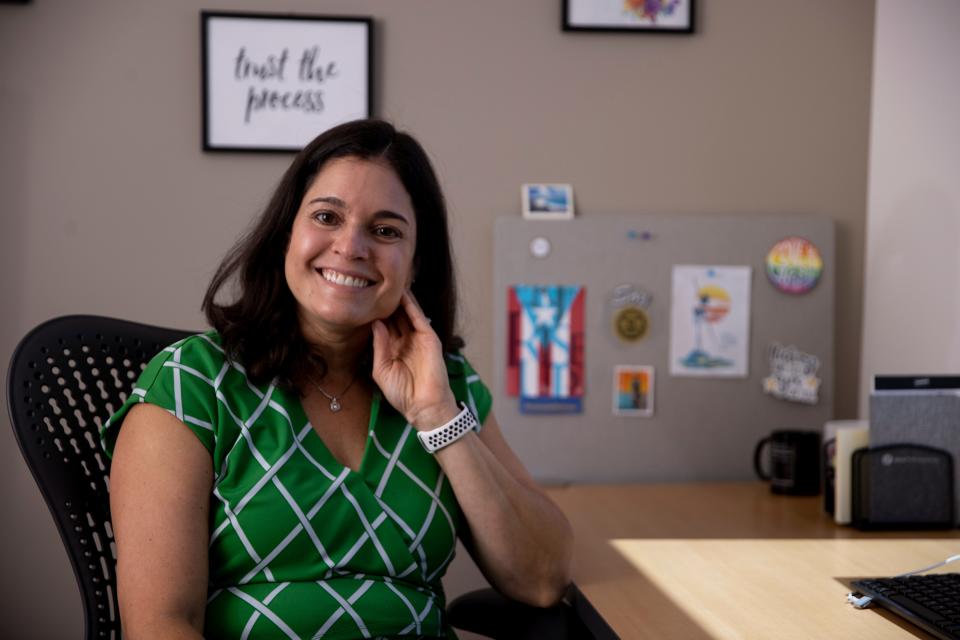Fewer than 5% of Latino cancer patients try clinical trials. OHSU wants to change that

Eneida Nemecek grew up in a small coastal town in Puerto Rico two hours away from extensive medical care.
When she moved to the United States to pursue medical and public health degrees, she said, she discovered even larger gaps in access to health care.
She said seeing the barriers many people face in accessing the medical care they need, such as language, lack of insurance, transportation, internet access, lack of direct outreach and lack of trust or understanding in doctors and researchers, drives how she approaches her work as both a physician and medical director of clinical research at Oregon Health and Science University’s (OHSU) Knight Cancer Institute.
“If you don’t take care of the whole patient, you don’t do medicine,” Nemecek said.
In March, Nemecek began leading a team at OHSU in a three-year project intended to bring cancer-related clinical trials and medical care to typically underserved communities.
For now, the project is focusing on Hispanics and Latinos, who make up 15% of the state’s population.
Right now, fewer than 5% of Latino or Hispanic cancer patients at OHSU enter clinical trials. Nemecek’s goal is to get that number to at least 10%.
Clinical trials don't just help advance clinical research, but also can provide patients access to potentially life saving treatment options.
The project will be completed in three phases using an annual $625,000 grant from Genetech’s Health Equity and Diversity in STEM Innovation Fund. But Nemecek wants to build something sustainable and applicable to other underserved communities, too.
“If something like this works and it improves the quality of care with the patients and it also allows us to deliver better care, it's also good for the organization,” Nemecek said.
Listening and building trust
Phase 1 of the project, which began in March, involves having conversations throughout Oregon with local leaders and six to 10 members of the Hispanic and Latino communities in the area.
“Part of the issue that we know about with people engaging in cancer care and clinical trials is the fact that we don’t communicate very well what that is,” Nemecek said.
Nemecek and her team identified six areas throughout the state where growth in the Hispanic and Latino communities have been the highest or the community is the most concentrated. These include visits to Washington and Yamhill counties, Gresham, Clackamas County, Woodburn, The Dalles, and Bend and Madras.

At these community conversations, Nemecek and her team show up with food and drinks and open a forum for people to discuss their perceptions of cancer clinical care and trials.
What do they know about cancer? What scares them about it? What don’t they know? What would they like to know? Are they receiving care? Why or why not?
Nemecek said she has loved connecting with people, but the most important part of these conversations is to listen so they can build trust with the communities. She said she introduces herself, then sits in the back and doesn’t say a word.
“Trust and listening are very close to each other,” she said.
Identifying needs and raising awareness
Phase 2 of the project will use insights the team gains from the community conversations to create educational content about types of cancers, treatments and the benefits of clinical trials.
When creating this content, Nemecek and her team will work with bilingual and culturally aware community health workers.
Nemecek said they have been asking communities where they get their information, and answers have ranged from on the radio to just someone they trust.
A lot of Hispanic and Latino farmworkers listen to the radio to and from work, Nemecek said, so they plan to create content that can be consumed visually, audibly and digitally.
They also are partnering with Elemento Latino, an Oregon-based entertainment agency that creates educational programs and public service announcements for TV.
“The goal is to address every single element of cancer in little capsules, kind of almost like commercial style,” she said.
Culturally competent health care navigation
In Phase 3 of the project, they will hire a Spanish-speaking, culturally aware patient navigator to help guide and support Hispanic and Latino cancer patients at OHSU.
OHSU’s Knight cancer institute already has nurse navigators to guide patients through diagnoses and help them understand treatment options as well as social navigators who connect them with resources. But Hispanic and Latino patients need a cultural partner, Nemecek said.
They are hoping to hire this patient navigator by the beginning of next year, Nemecek said. They will then spend the rest of the project continuing to test this system to see how it is working for patients and how it might improve.
“Three years is the beginning of this,” Nemecek said. “We’re going to need different team members that we can extrapolate to other ethnic groups as well.”
The Hispanic and Latino community makes up the largest minority group of Oregon's population, so Nemecek and her team wanted to start there. But they said this work is important for everyone.
Nemecek hopes this project will become a template they can use to close gaps in access to health care for underserved communities.
“If you take care of the most vulnerable people in your community, by default you're going to take care of everybody,” she said.
Anyone interested in participating in a clinical trial at OHSU can search by study type, topic or medical department at studypages.com/ohsu/home/
Sydney Wyatt covers health care inequities in the Mid-Willamette Valley for the Statesman Journal. Send comments, questions, and tips to her at SWyatt@gannett.com, (503) 399-6613, or on Twitter @sydney_elise44
The Statesman Journal’s coverage of health care inequities is funded in part by the M.J. Murdock Charitable Trust, which seeks to strengthen the cultural, social, educational, and spiritual base of the Pacific Northwest through capacity-building investments in the nonprofit sector.
This article originally appeared on Salem Statesman Journal: Effort underway to expand Latino access to cancer trials, care

